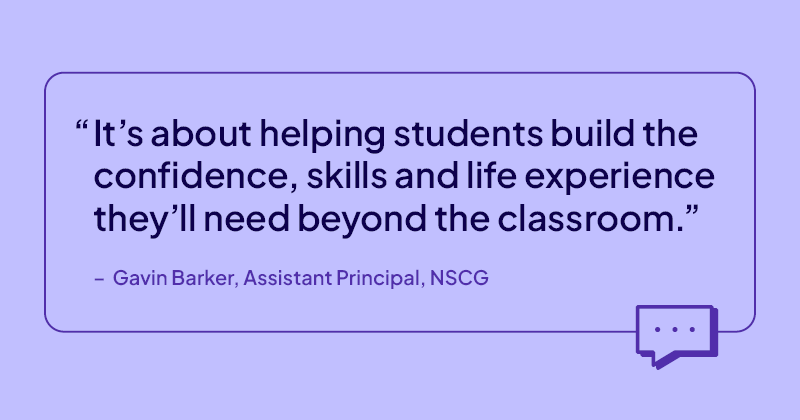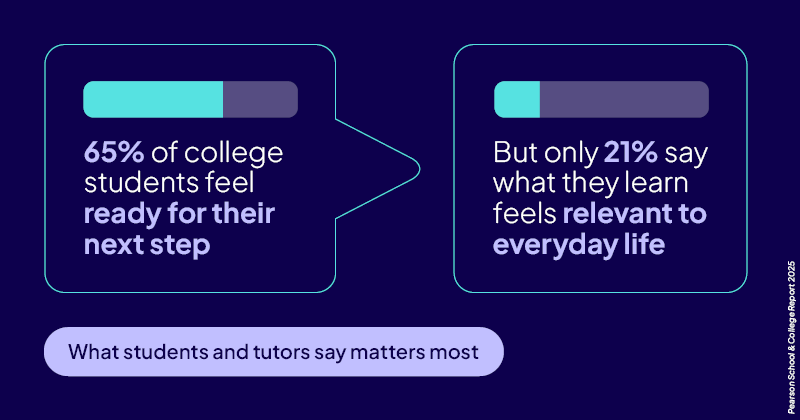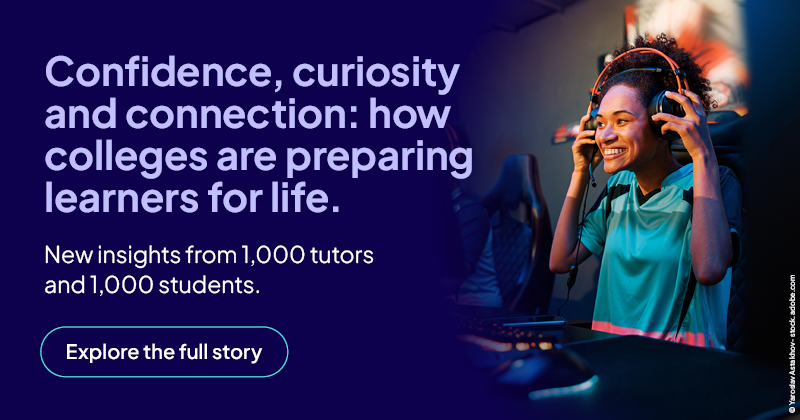The tools to succeed
Data from Perspectives, Pearson’s first-ever college report, shows that two-thirds of students in England (65%) feel they will be ready to move on to their next steps by the end of their course, while more than half of tutors (54%) say their students are genuinely engaged in learning. The report also found a widely shared appetite for education that balances wellbeing and ambition, giving students the tools to succeed in work and life. However, just 29% of students told us they enjoy applying what they learn, while a third (33%) enjoy discovering new things.
For tutors, the priority is clear: help students develop problem-solving skills, communication, collaboration, self-confidence and a growth mindset that reframes ‘failure’ as valuable – all qualities Perspectives identified as most important for 16- to 18-year-olds.
The Newcastle and Stafford Colleges Group (NSCG) exemplify the report’s findings in action. “We’ve got a number of initiatives to help students develop confidence and life skills,” says Gavin Barker, assistant principal for Teaching, Learning and Quality, “but honestly, a lot of it happens every day through skilful teaching, learning and assessment.
“We’re lucky to have a really skilled team of teachers and a pastoral tutor system that’s a bit different from other colleges,” he adds. “Our personal tutors only tutor. Their role is to support students’ development and act as a key point of contact. Because of this, they’re very well equipped to spot if a student is struggling with their wellbeing.”
Connecting learning to the real world
In Perspectives, students’ answers put “developing skills [to] use in everyday life” at the top of the most important reasons for learning, yet only 21% feel what they learn is relevant to their everyday experiences. With life after the classroom understandably a major preoccupation for college students (almost four in 10 are worried about getting a job or progressing in their role), the findings suggest that grounding more subjects in wider world contexts could be the solution.
“Work experience and industry placements are a huge part of what we do,” Gavin from NSCG tells us, and are key to helping students see the everyday relevance of their learning. Every student, regardless of level or course, completes at least 24 hours of work experience. Ideally, it’s in the field they want to progress into, but sometimes it’s more about developing wider skills – for example, working in a charity shop to build confidence and customer service.”
Placements like this, as well as other initiatives like guest speakers, help students connect the classroom to life beyond it, reinforcing Perspectives’ finding that practical relevance is a powerful driver of engagement.

A drive towards digital skills
The report also looked at the transformational impact of technology, seeing responses that underscore both the importance of preparing students for rapidly changing careers and the recognition of digital literacy as a core life skill.
Through Perspectives, as many as 6 in 10 tutors are calling for curriculum reform to embed digital and AI skills, with 58% believing AI will have a positive impact on vocational job prospects in the future.
“One of the biggest misconceptions is that all young people are digitally skilled,” says Gavin Barker. “They’re confident on phones, but many struggle with Excel, PowerPoint or Word. Part of our job is ensuring they leave with those essential digital skills for higher education or employment.”
Yet there are clear gaps to be addressed among those teaching: while 6 in 10 (61%) feel confident in their own ability to help students develop digital skills for the workplace, many tutors feel they need additional support to confidently embed AI and technology into lessons.
At NSCG, leadership is tackling this issue by appointing a digital technologist across its colleges. Their role? “[To] help staff and students build digital confidence, with AI being a key focus.” Gavin adds: “It’s about helping students understand how to use AI ethically and effectively, and supporting staff to use it to enhance teaching, learning, and assessment.”
Life skills for lifelong success
Transferable skills – including creativity, critical thinking, teamwork and resilience – are seen as critical qualities too, Perspectives responses showed. A number of colleges have found proactive ways to teach them. NSCG’s Skill Up, Stand Out initiative is just one example.
“Three times a year, students assess themselves against ten key skills we’ve identified using local and national intelligence about what employers need,” says Gavin. “These include communication, confidence, critical thinking, digital skills, literacy, numeracy, resilience, technical skills, time management and teamwork. Tutors then use this information to adapt teaching – so if a group is struggling with teamwork, for instance, we’ll embed more group activities. It’s a way to make those transferable skills visible and intentional.”
By combining structured skills tracking with everyday learning, colleges can offer students vital tools to navigate interactions and experiences. Doing so aligns directly with one of Perspectives’ key conclusions: that life skills and wellbeing are key to preparing students not only for their next academic steps or first job, but for lifelong success.

Preparing students for tomorrow
The discoveries of the report make it clear that colleges do so much more than meet basic course and qualification requirements. The value they place on life skills, digital literacy and opportunities for real-world connections shows tutors’ deep care for fostering confident, curious, capable learners.
What can this look like in practice? Colleges like NSGC are giving us their version of what’s possible. Alongside them, Pearson is here to translate research and insights into tangible change and experiences, helping prepare every student for a future of opportunities.
















Your thoughts